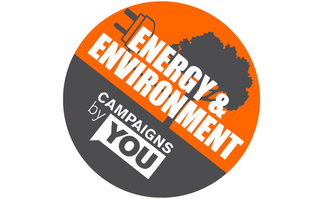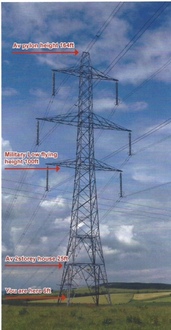-
Stop the theft of electricitySmart meters only record electricity used and not the excess electricity generated by small generators like personal homes with solar panels. The government pays a feed-in tariff but the excess electricity is still being placed on the national grid and sold by electricity companies when they have not paid for it. This is theft, pure and simple. Stop this theft by ordering all smart meters to record both incoming and outgoing electricity and make the electricity companies pay for the excess being generated or deduct the excess from the incoming electricity.6 of 100 SignaturesCreated by Tony Upton-Huang
-
Fracking: KCC must consult the people of KentKCC’s Proposed modifications to the Kent Minerals and Waste Local Plan (MWLP) 2013-30. state that subject to certain conditions, planning permission will be granted for proposals associated with the exploration, appraisal and development of oil, gas and unconventional hydrocarbons. This blanket approach ignores the inherent risks of fracking which have been well documented around the world. The dangers are real and critical. Consultation on the subject has been buried in obscurely worded documents that will have successfully slipped below the radar of most of the residents of Kent. This is not an acceptable democratic approach. KCC must ensure they represent the views of the residents and land-owners of Kent before permitting any fracking activity to take place on Kentish soil.318 of 400 SignaturesCreated by Sue Rule
-
KEEP HYNDBURN FRACK FREEUnconventional gas exploitation - "fracking" - is a ridiculous idea. The Government's arguments used to justify fracking are as follows: That it will create jobs, that it’ll bring down energy bills, that it’s good for our energy security and it's a transition fuel to a green energy economy. 1. That it will create jobs. A Department for the Environment and Climate Change’s (DECC) report estimated a maximum of 24,300 of them. Yet 400,000 jobs could be created by 2020 by investment in the clean energy sector. 2. That it’ll bring down energy bills like it has in the US. But the UK’s geology is more complex than in the US, which means that the process here will be uneconomic. Even if that wasn’t the case, unlike the US, the UK exports gas as part of a European gas market, and as fracking companies will sell to the highest bidder of these European countries, there could never be a guarantee that UK energy users would be the beneficiaries. 3. That it’s good for our energy security A House of Commons Energy and Climate Change Committee recommendation was that shale gas should not be relied on to contribute to energy security. An energy security expert has said the best way to reduce energy security risks is to promote renewable power generation, improve energy efficiency and reduce overall energy demand. 4. A transition fuel to a green energy economy. Department for Energy and Climate Change-commissioned report on fracking’s greenhouse gas emissions has been shown to be based on poor data and exaggeration. When the actual figures are factored-in, the report shows that burning shale gas to produce electricity is about as bad as, or very possibly even worse than burning coal! The arguments against fracking are so numerous: The UK’s geology is too complex for fracking to be safe or economic. The UK’s geography means we don’t have America’s wide open spaces away from the population or agriculture. Water contamination. The UN has listed seven different ways this can occur. The huge quantities of water required. The carcinogenic properties of the chemicals used. Air pollution. Earthquakes. Industrialisation of countryside and loss of agricultural land to roads, well-pads, pipelines, compressor stations and so on. Traffic/chemical spills/noise and light pollution. Impact on tourism. Even if none of the above applied this doesn’t discount the big one – climate change. A growing number of climate change scientists are recognising that to have any chance of us staying below the two degree increase in global temperature that is required to avoid catastrophic climate change, we have to leave 80% of all already discovered fossil fuels in the ground. So why does this government want to find more of the stuff if we can’t burn it? Not all governments are hell bent on fracking - far from it. There are bans or moratoriums on fracking in France, Germany, many American states, and at least twelve other countries worldwide. And there are attractive alternatives, particularly for the UK as we have the best renewable energy resources in Europe. That’s where our energy security is - and the 400,000 jobs to get our economy back on track. A policy of support for fracking is a vote-loser. As elected representatives of Hyndburn we the community call on you to say no to fracking and yes to keeping Hyndburn frack free?199 of 200 SignaturesCreated by Kerry Gormley

-
bring gas,electric and water supplies back to state ownershippeople are freezing and starving to death due to extortionate costs of essentials1,068 of 2,000 SignaturesCreated by Ian Stromberg
-
Stop the UK government killing off the UK solar industryThe Dept for Energy and Climate Change has just unveiled sweeping plans to slash subsidies to solar power. They are proposing measures that include cutting aid to small-scale solar power installations, and ending subsidies for roof-top panels earlier than expected. Solar and wind energy installations of less than 5MW are supported by feed-in tariffs - schemes that pay producers a subsidy for the electricity they generate, plus a bonus for any electricity exported back to the national grid. Under the new proposals, the amount to be paid from next year will fall to 1.63p per kilowatt hour from a current level of 12.92p for a new residential solar system. This is a hugely short sighted move by the government and is devastating for Britain's solar sector which employs over 35,000 people. The Secretary of State herself has stated that the total cost this year of the solar RO was just £3 per household on energy bills. Ending support for solar power makes no sense at all. The energy market currently has a wide range of subsidies and tax allowances in place, across all the technologies – renewables, nuclear and gas - and not all of these are transparent when it comes to the consumer. They have made these announcements after the House of Commons has risen for the summer recess so proper scrutiny in Parliament will now not be possible until after the consultation deadline. The Welsh government is already concerned, a spokesperson said the plans have the "potential to put jobs and investment under threat by reducing subsidies to projects already in the pipeline". The government is deliberately over-exaggerating the impact of renewable energy on bills and the timing of this move on solar power could not be worse as it is nearly subsidy free. Greenpeace pointed out that the government's maximum additional spend on green technologies by 2018 would be approximately half of what it spends subsidising the coal industry. Other groups called the changes "absurd". "Of course the feed-in tariff should fall as solar becomes cheaper, but the government clearly plans to remove support entirely," said Alasdair Cameron from Friends of the Earth. "This is politically motivated, and will take away power from people and hand it back to big energy firms." “Cutting the subsidies now will see businesses go bust and investment dry up. Jobs will go and emissions will stay higher at a time when policies and funding should be in place to ensure quite the opposite,” said Daisy Sands, head of the energy campaign at Greenpeace. Ray Noble, owner, Solar BIPV Ltd and Solar Power Portal outstanding achievement award winner has commented: "The decision to stop supporting the fastest deploying energy generation technology seems like madness to me. Especially when you consider that we are short of electricity, that solar has the biggest support of the the population; yet at the same time still giving 2 ROCs to other technologies that are creating the largest drain on the budget. Seems like winners are not liked and losers are preferred! “Combined with the cuts to wind subsidies, it looks like the government is gearing up for a full frontal attack on the renewable energy sector in the autumn while still handing out billion-pound tax breaks for oil and gas industry … It’s no good David Cameron saying how important the climate talks in Paris are, if the chancellor simultaneously weakens any shred of credibility of a claim to the UK’s low carbon leadership.” Please sign the petition now to help save jobs in the UK and support our commitment tackling climate change.32,199 of 35,000 SignaturesCreated by R V
-
To get all energy companies to repay the money overpaid by prepayment energy customersAround 5.9 million people in the UK have a prepayment energy meter. According to citizens advice these customers have overpaid for their electricity and gas by £226 a year! http://www.bbc.co.uk/news/business-33369672 Many of the people who prepay their energy are families struggling to make ends meet, or elderly people - while people have had to choose between light or heat companies have racked in massive profits that have not fed back to lower the prices - in fact EDF declared an "operating loss" on their prepayment statement this year! http://www.mirror.co.uk/money/energy-giant-raked-massive-profit-3143336 Customers who have overpaid their energy through prepaid meters have been doing so for a number of years and is an industry wide practise. Customers who prefer to prepay for their gas and electric should not be penalised for doing so. It is not enough to tell customers to switch companies, customers who have been with a provider a period of time and who been overcharged as a matter of routine should receive a refund on any over payment, and tell customers before they sign up if they are being overcharged.272 of 300 SignaturesCreated by Michael Turner
-
Stop the Dumfries & Galloway Pylons- The proposed pylons will be massively visually intrusive in what is one of the few beautiful, unspoiled parts of the UK left. - They will harm the environment and local wildlife. - They will be hugely damaging to the tourist sector in Dumfries and Galloway, a key driver of the local economy. - The pylon line will seriously affect house values and the ability to sell houses for miles around due to its size and visual impact. - Other alternatives, such as putting the line underground or under the sea, are available and could be adopted.2,330 of 3,000 SignaturesCreated by David Howdle
-
zero carbon housing is goodWhile it may make new homes fractionally cheaper to buy, they will be much more costly to run for both the home owners and the planet. How will we meet our green emissions targets with retrograde steps like this?163 of 200 SignaturesCreated by candida lonsdale
-
Simple law to stop misery of shoddy products.Imagine if manufacturers had to say how long they expect their products to last and backed it with a guarantee. For the first time people will be able to make a real choice when they buy something. e.g. "Do I get the £15 kettle that lasts 1 year? or the £30 kettle that lasts 5-6 years?" This makes things simple. We deserve to know what we are buying! "Planned Obsolescence" (where manufacturers purposefully design their products to break or be unfixable) is on the rise. It might bring profits in for shortsighted companies, but it is a growing disaster for the environment and it means that we are stuck buying the same shoddy things again and again. Having your kettle/hoover/dishwasher break is not just annoying, it traps people in a cycle of poverty. But there's something we can do! If people know how long something is expected to last, we can see if the "cheap prices" are really worth it. It's likely that companies will realise that have to do better, and up the durability of their products or risk having to publish some dismal figures. Us consumers have been trapped by these companies strategies for too long and it's time for us to get some power back. The power of choice. Please sign the petition. The planet will thank us all. We can do it! Tara PS. Follow and share the campaign with the hashtag #built2break11,662 of 15,000 SignaturesCreated by Tara Button
-
Save Onshore Wind!It is essential that we decarbonise the UK's electricity generation sector. Onshore wind has made a very significant contribution to delivering decarbonisation to date and had been moving towards a position of being independent of subsidies. Brutally cutting subsidies now will effectively destroy the onshore sector at a critical time in its development. This makes no environmental or economic sense, just as decarbonisation targets are about to be missed and we are approaching the Paris Climate Change Summit. The Government's own surveys show that onshore wind commands the support of over two thirds of those asked, far more than fracking. The Govt's destruction of the onshore wind sector will destroy invester confidence in UK renewables and will fly in the face of global moves to protect the climate.21,912 of 25,000 SignaturesCreated by Dan Grierson
-
All new homes/buildings should be built with solar panel tilesIt helps to increase the national % of renewables. It creates new manufacturing jobs. It upscales production of solar panel tiles reducing the price for home owners in existing buildings to buy and install them on their homes.242 of 300 SignaturesCreated by Yogaforu Leeds
-
NO DRILLING, NO FRACKING, NO UCG IN SCOTLAND.ONE DOWN, TWO TO GO. Now they are listening, let's continue to shout! This petition was part of a campaign by Scottish communities that resulted in the Scottish Government putting a temporary ban on Underground Coal Gasification on October 8th 2015. This means the first campaign aim above has been achieved, but we are not finished. We need to use your signatures and the power that communities have found to continue to campaign to ensure a complete ban of all forms of Unconventional Gas Extraction in Scotland. Read on for more information on why you should sign and share this petition! But isn’t there already a ban? Unconventional Gas extraction in Scotland is currently covered by two separate temporary bans (moratoriums): a moratorium on Fracking for shale Gas and Coal Bed Methane developments was announced in January 2015 and a moratorium on Underground Coal Gasification developments in October 2015. These moratorium Are NOT BANS. They are pauses, allowing time for the Scottish Government to conduct studies into Unconventional Gas and to consult with communities. The moratoriums are likely to last until 2017. Our Forth believe therefore it is imperative that these moratoriums are viewed as a call to action for concerned communities to continue to inform themselves and their neighbours about the potential risks and alternatives to these industries. Why is a complete ban needed? Our Forth believe that the science is clear that the Unconventional Gas Extraction, including Fracking for Shale gas, Coal Bed Menthane Extraction and Underground Coal Gasification, cannot be done safely and is unlikey to bring economic benefits in the form of jobs and increased investment. We believe the more that ordinary people learn and research about these industries and learn of the scale of drilling that will blight their lives, industrialise rural areas, and devalue their homes - the more they will oppose it. We believe that any perceived benefits will come at a major cost to established Scottish industries (such as the tourism and food and drink industries), our natural environment and people's health. We believe that the main beneficiaries will be multi-millionaires and wealthy landowners, not the Scottish communities that will bear the burden of risk. We believe that these activities are entirely incompatible with the Scottish Government’s commitment to climate change targets. Our Forth want Scotland to follow the lead of enlightened countries and areas around the world banning these technologies and investing in the jobs and energy security that renewable energy can bring. Why a 2km Buffer Zone? In 2013 the Scottish Government introduced a requirement for developers to propose buffer zones between unconventional gas developments and communities. Disappointingly there is no minimum limit specified under Scottish Planning Policy. Ineos this summer stated that they would be looking at only 400 m Bufferzones between it’s fracking operations and communities!! Our Forth believe that this is not good enough to protect communities, and support Friends of the Earth call for a 2km buffer zone as is the case in New South Wales, Australia since February 2013, immediately and irrespective of the current moratorium. Our Forth believe that implementing 2km Buffer zones in Scotland would also have the effect of ruling out Unconventional Gas development in our densely populated areas, as it would effectively make it uneconomical for the companies involved. Watch this beautiful 10 minute video to find out more about our campaign: Our Forth from Waltzer Films on Vimeo.8,254 of 9,000 SignaturesCreated by Juliana Muir
Hello! We use cookies to improve your experience by providing insights into how the site is being used. Find out more.











